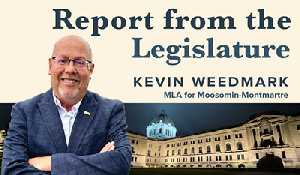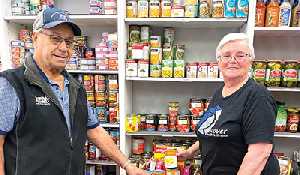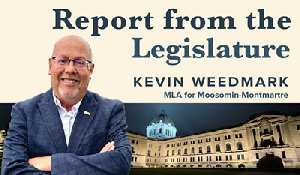Moe, Harrison respond to US tariff talk
December 2, 2024, 4:00 pm
Ryan Kiedrowski, Local Journalism Initiative Reporter


On Nov. 25, president-elect Donald Trump vowed to place heavy tariffs on the United States’ three largest trading partners—Canada, Mexico, and China—saying that the tariff on imports from Canada and Mexico in particular would remain until action regarding migrants crossing borders and illegal drugs (particularly fentanyl) were undertaken.
Trump has proposed a 25 per cent tariff on Canadian goods entering the United States.
Premier Scott Moe said he felt the tariffs would have a significant impact on provincial exports. Speaking with reporters early last week, he pledged support in working with provincial and federal counterparts toward a solution.
“In Saskatchewan, we export about 60 per cent of our products to the U.S., so I don’t think any job or any industry would be untouched with a 25 per cent tariff from the U.S. on all Canadian products,” he stated. “We’ll be working alongside our federal government, in outreach that they have with the incoming Trump administration, we’ll be working, and have already started working with our Council of Federation tables, as well as our federal provincial territorial tables at the ministerial level where we can to advocate and use our collective resources and contacts.”
Acknowledging the border concerns presented by Trump, Moe would like to see a Canadian Border Services Agency with some bigger teeth.
“One of the things that I’ll suggest to the Prime Minister is to increase the border security initiative that we have through the CBSA, maybe even bring the CBSA under an arm of the military, and increase some of the supports, which would also increase our percentage of defence funding, our military funding as well,” Moe said. “I think that might be a way for us to really work collaboratively, to work together with our American neighbour, but also ensuring that we do have a secure border.”
Provincial Agriculture Minister Daryl Harrison spoke about the tariffs while at Canadian Western Agribition in Regina.
“We are well aware of the 25 per cent tariff announced by president-elect Trump,” he said. “We will meet this challenge head on, and we look forward to working together as a common front. Saskatchewan will continue to engage in other trade missions to strengthen our markets for products and help establish new ones. Trade diversification is a key to sustained growth and is only becoming more important.”
Harrison reassured producers in the opening of a morning session during last Tuesday’s Grain Expo.
“You have my commitment as the new Minister of Agriculture that a top priority will continue to be talking and listening to our partners and stakeholders like you,” he said. “We as government need your input to help guide and inform our actions, and my door is always open to hear your industry’s concerns and to find solutions.”
Others were not as phased by the looming tariff threat. One such voice was Karina Gistelinck, Asset President of Potash with BHP, who spoke on the progress of their $18 billion Jansen mine project currently underway last week during Agribition.
“We have a strategy to be geographically diversified with our sales. So we will not just sell to the U.S., we will sell all over the globe,” Gistelinck explained when asked by reporters how the tariffs might affect BHP, if at all. “Obviously, the U.S. is a big end user consumer for potash, and we will take that into account. Now, one thing I can tell you, tariffs come and go and again, we need to be resilient to tariffs, to price changes, and we will do that by being the lowest cost, safest, most sustainable mine here in Saskatchewan.”
One needs only look back to the 2018 ‘tit-for-tat’ tariff banter initiated by the U.S. and retaliated upon by Canada for an example of tariffs coming and going, as Gistelinck noted. In the aftermath of those trade disputes, taxpayers and businesses bore the brunt of the economic impact.
Figures released late last week from the Canadian Chamber of Commerce predict far-reaching consequences for the economies both north and south of the border should the 25 per cent tariff come to fruition. The group foresees Canada’s GDP dropping by 2.6 per cent, or $78 billion, working out to $1,900 per person a year. In the U.S., their GDP would also shrink by 1.6 per cent or $467 billion USD, costing each one of their citizens some $1,300 annually.
“A 25 per cent tariff applied across-the-board on all U.S. imports could push Canada’s economy into recession by the middle of 2025,” said Stephen Tapp, Chief Economist with the Canadian Chamber of Commerce. “But these results also underscore Canada’s economic importance to the U.S.—something that’s often under-appreciated south of the border. Make no mistake, if Trump imposed these tariffs, it would represent a significant negative shock to the U.S. economy. It would raise costs for businesses, make American production less competitive internationally, and raise prices even more for consumers who have recently suffered through the pandemic and the highest inflation in generations.”



































